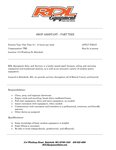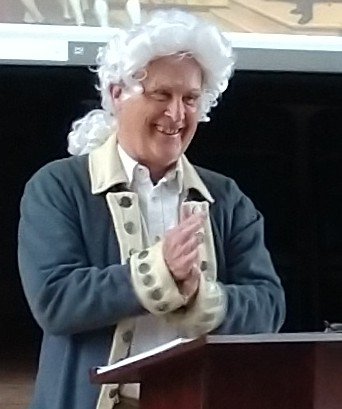The Founding Fathers Create a New Nation
Rehoboth Ramblings
The American Revolution has been on the minds of Rehoboth’s history discussion group this year. In February, they tackled the next big topic in American history, the Constitutional Convention in Philadelphia. To help bring the past to life, the group tried something new, re-enacting moments from the convention in May 1787, complete with 18th century costumes, including wigs, loaned by Rehoboth’s Carpenter Museum.
Hank Coleman, who leads this group, explained how difficult it was for the delegates from the 13 former colonies to get together and agree on the monumental business of trying to establish an entirely new nation. Not only were they at odds on many key points, they had their own currencies, and nine of them had their own separate navies!
A few costumed members of the group each read the words of some of our founding fathers (and mothers, in the case of Abigail Adams). Hank took the part of Nathaniel Gorham of Massachusetts, who served as Chairman of the Committee of the Whole, which set rules of procedure.
Others taking part in the presentation on Feb. 18 were: Tom Charnecki as George Washington, Robert (Otter) Brown as Thomas Jefferson; Herb Adams as his own ancestor John Adams; Thurston Tarter as James Madison; Laura Samsel as Dolley Madison; Joyce Coleman as Abigail Adams; David Stewart as Charles Pinckney; Ron Whittemore as Benjamin Franklin; and Steve Krawiec as Alexander Hamilton, the only one of our founding fathers to have a wildly popular musical written about him some 200 years after his death.
In a video about this crucial period for the U.S., historian Gordon Wood, now professor emeritus at Brown, said that bringing 13 independent states together was no easy task. “It was the last and greatest battle of the Revolution, to be fought with words, not guns. Never before had people deliberated about forming a whole new country.” It was even more difficult because “the US was bankrupt, there were huge war debts and an economic depression.”
At that time most Americans had never been further than 30 miles from their home. Shays’ Rebellion in 1786 in central Massachusetts was prompted by citizens’ outrage at high taxes. Shays became a folk hero to some, but creditors feared mob rule. Washington warned, “What a triumph for our enemies if we show that we are incapable of governing ourselves.”
Hamilton, as an outsider originally from the Caribbean, did not have a special attachment to any of what he called “13 petty republics”. At the convention in Philadelphia, Hamilton spoke for six hours on his 11-point plan for a federal government. Speaking about a monarchy, Ben Franklin said that “two passions govern affairs of men – ambition and avarice. Few kings would not follow example of the pharaoh, if they could.”
And let’s not forget Abigail Adams, who wrote to her husband John: “In the new code of laws which I suppose it will be necessary for you to make, I desire you would remember the ladies and be more generous and favorable to them than your ancestors. Do not put such unlimited power into the hands of the husbands. Remember, all men would be tyrants if they could.”
The re-enactment continued on Feb. 25, with an educational video that made it clear just how difficult it was for the delegates to the convention to reach an agreement acceptable to everyone. Should they do away completely with the existing Articles of Confederation and come up with an entirely new form of government? The main focus of the debate was about the rights of the individual states vs. proportional representation of all the states in one unified national government.
To make matters worse, the delegates were meeting in the stifling heat of a Philadelphia summer, keeping the windows closed so that they could keep their discussion secret until they had reached a decision. With all the problems facing the fledgling new nation, they knew that the eyes of the world were on them and what future they chose for the United States.
This informal study group is open to all interested people. It meets at 11 a.m. at Goff Hall on Tuesday mornings. No homework is required, but additional reading is suggested for those who want to know more. Next topics coming up are the presidencies of George Washington and Thomas Jefferson, followed by the War of 1812. To find out more you can contact Hank Coleman (hjcoleman@comcast.net).


















Comments
No comments on this item Please log in to comment by clicking here